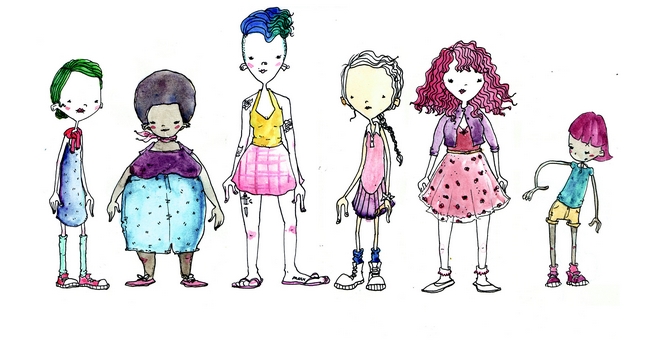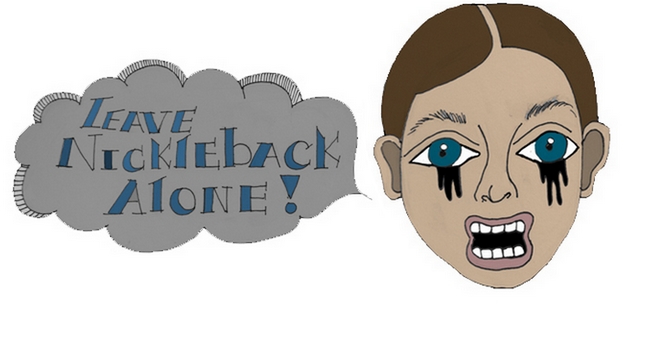If you’re a living human with an internet connection, you’ve probably seen the viral music video “All About That Bass” by Meghan Trainor; it’s gotten more than 40 million views since it was posted in June.
It’s a fun video, right? So upbeat! Such a positive message! Well, actually, no. Let me go ahead and ruin this song for you.
“All About That Bass” is not a body-positive song and it has nothing to do with female empowerment. It continues to judge the worth of a woman’s body by its effect on men, and replaces thigh gaps with curves as the standard that female bodies should conform to.
 The song does have one nearly perfect line: “I see them magazines/Workin’ that Photoshop/We know that shit ain’t real/Come on and make it stop/If you’ve got beauty, beauty, just raise ’em up/’Cause every inch of you is perfect from the bottom to the top.” This seems to be the intent behind the song—calling out unrealistic beauty expectations and telling girls and women that they’re beautiful as they are. But that’s not the message the rest of the song brings.
The song does have one nearly perfect line: “I see them magazines/Workin’ that Photoshop/We know that shit ain’t real/Come on and make it stop/If you’ve got beauty, beauty, just raise ’em up/’Cause every inch of you is perfect from the bottom to the top.” This seems to be the intent behind the song—calling out unrealistic beauty expectations and telling girls and women that they’re beautiful as they are. But that’s not the message the rest of the song brings.
Trainor sings, “I got that boom boom that all the boys chase/All the right junk in all the right places.” (Side note: Thanks to “Adventure Time,” “boom boom” automatically makes me think of poop.) Then, later: “My momma, she told me don’t worry about your size /S he said boys like a little more booty to hold at night.” Noticing a pattern?
There’s nothing wrong with a straight woman wanting men to be attracted to her; it’s only natural. But that seems to be Trainor’s only justification for liking her body, and that thinking is a recipe for disaster, because it relies on outside validation. What about the overweight teenage girl who isn’t being chased? Is she not the right kind of fat? Should she still be happy with her body?
As a teenager (and, in fact, today), I had plenty of booty, but hardly anything up top. Assurances that guys like curves did nothing for me, because I still wasn’t convinced I had the right curves. It actually made me more miserable—not only could I not be skinny enough, but I couldn’t even be fat correctly, as evidenced by the complete lack of boys chasing me.
That’s the danger of saying fat is okay because it’s attractive. If you’ve got the “boom boom” (ugh) and you’re still not getting male attention, then something else must be wrong with you, according to insecure teenage logic. Even if you’ve got the boys now, they aren’t a reliable source of validation; they could go away at any time.
If you’re actually going to accept your body, you can’t let anyone else be the judge of its value.
Then there’s the second theme of “All About That Bass,” the one that passive-aggressively demeans skinny women. Trainor sings, “I won’t be no silicone stick figure Barbie doll/So if that’s what you’re into, then go ahead and move along.” Her derision is misplaced; though ostensibly mocking women who let dieting consume their entire lives, she’s also throwing shade on the many women who are just plain thin, no matter how much they eat. Should those naturally skinny women try to fatten up? Or are they allowed to be comfortable with their bodies, too?

In the most criticized line of the song, Trainor says, “I’m bringing booty back/Go ahead and tell them skinny bitches that/Nah I’m just playing, I know you think you’re fat/But I’m here to tell you every inch of you is perfect from the bottom to the top.”
Ah, the old “just playing,” the refrain of offensive people everywhere. (“It’s a joke! Get a sense of humor.”) Like its close cousin, “no offense,” “just playing” allows you to say the rude things on your mind, but shield yourself from backlash. If the line is really meant to be ignored, then why include that cattiness in the song at all? Trainor’s little backhanded compliment rings false, and undermines her otherwise wonderful message (not to mention she’d be a “skinny bitch” to the average American woman, who wears a size 14).
These digs at thin women fall into the same faux-accepting camp as oft-slung phrases like, “Real women have curves!” or, “Zero is not a size.” While trying to even out the scales, the Meghan Trainors of the world merely tip them in the other direction—instead of saying fat is inferior, they say fat is superior. You’re not a woman if you don’t have “all the right junk in all the right places” (sorry, flat-chested “women” of the world), and if you’re a size zero, maybe you should eat a sandwich or something.
I understand the appeal of a song like “All About That Bass,” and I’m not telling anyone to boycott it, per se (for one thing, it’s so damn catchy you probably can’t avoid getting it stuck in your head). I’ve been a heavy girl in a skinny girl’s world. I’ve seen the perfect bodies plastered everywhere and I’ve tried to diet my way down to their size, only to end up feeling like a failure when it didn’t work. Hell, I’m not even technically plus-size and I’ve been made to feel like shit about my body. It takes a lot of work to reprogram your brain, ignore that pressure to be thin, and truly stop giving a damn about what size you are. I welcome any song, or any anything, that helps dismantle the idea that being fat is a moral failing.
But mocking thin women won’t make the world a more accepting place. Basing your self-worth on the attention of men won’t make you any more confident. Accepting yourself has nothing to do with any outside forces; it’s simply saying, “I am what I am, and I like me”—whether you’re a size 2 or a size 22.



